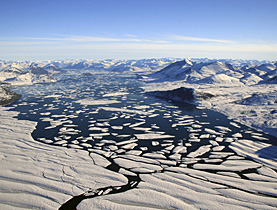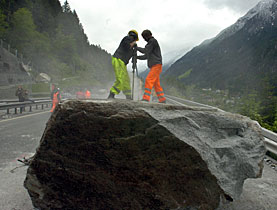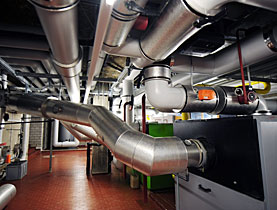Swiss urged to pursue bolder climate policy

Switzerland should seize climate change opportunities to become a green role model and strive for more ambitious emission targets, says a leading climate expert.
swissinfo.ch caught up with Swiss climatologist Thomas Stocker, who co-chairs a working group of the prestigious Intergovernmental Panel on Climate Change (IPCC), after his speech at the third World Climate Conference in Geneva on Monday.
The week-long event is being organized by the World Meteorological Organization (WMO), together with Switzerland, and seeks to improve the way climate information is collected and shared.
It aims to provide important technical tools for the crucial United Nations World Climate Conference in December in Copenhagen, Denmark.
swissinfo.ch: Are we heading for an ambitious outcome at the climate change talks in Copenhagen?
Thomas Stocker: It’s hard to say. In the end every country will have to deliver. The problem of global warming is so huge that it will require all societies on this planet to deal with it according to a clear schedule of emission reductions and adaptations.
swissinfo.ch: Do you believe political efforts to restrict global warming to an additional two degrees Celsius by 2050 – the level the European Union describes as dangerous – will succeed?
T.S.: Scientists had all the facts and figures 30 years ago when such a target would have been achievable with relatively persistent but gradual changes to production techniques or use of energy.
But this target has become very ambitious and if decisive steps are not taken it may become unachievable.
swissinfo.ch: What should be done to best mitigate the effects of climate change?
T.S.: One single measure cannot solve the problem. We need to devise a plan where all sectors of society contribute to the grand goal of de-carbonizing society. We need to close the material and energy cycles as much as we can.
swissinfo.ch: What’s your view on the new Swiss government proposal to reduce CO2 emissions by 20 per cent by 2020 in line with the EU?
T.S.: Climate change should also be considered a huge opportunity. It’s very clear that de-carbonizing society requires new technologies and products that will come on the market.
A country like Switzerland, which is highly industrialized and has a high capability of innovation, should seize this chance to innovate products and move towards a model society where consumption of CO2 per capita is drastically reduced.
I welcome a clear target by 2020, and beyond to 2050, but a role model should strive for ambitious targets. There are other countries in the EU that have ratified higher targets. Sweden is committed to a reduction of 30 per cent, and if Europe implements reductions by 2020 it will go to 40 per cent.
I think if we made an effort we would be able to go that high. Studies have shown that there is a lot of potential in renovating buildings, making them more efficient in terms of heating. Also, savings can be made in private mobility.
swissinfo.ch: What important climate changes have you observed since the fourth IPCC report in 2007?
T.S.: Certain elements of the climate system have exhibited rapid change, like Arctic sea ice coverage. We had record minimum sea ice coverage in September 2007. At the same time we have noticed that the quality of sea ice has changed dramatically in that area. The volume of multi-year ice, the most persistent, has halved over a year. That region has become more vulnerable and this is a cause for concern.
On the other hand there are developments in the climate system that need to be studied very carefully, for example variations of solar radiation and their effect on the climate system.
A third point is that CO2 emissions, the primary driver of climate change, have increased to levels that are higher than the six illustrative scenarios we used in the past assessment report [1.8-4 degree Celsius increase by 2100]. We need to see whether this was a temporary maximum rise in emissions or whether we are actually on the path to sustainable high emissions, which would imply that revisions of the highest scenarios will take place.
swissinfo.ch: The 3rd WMO World Climate Conference aims to improve access to climate prediction and information services. Is climate information not properly shared or exploited globally?
T.S.: It’s clear that there are great gaps in our capability to observe the climate system, not just temperatures, but also precipitation, clouds and other important features that are necessary to assess ecosystems.
In many regions of the world there are large gaps where information is not available, not freely accessible or not taken up.
I’m very confident that the WMO countries present here will commit to the implementation of this idea of “climate services” to inform people and provide the best possible information to help them adapt to and mitigate against climate change.
Simon Bradley, swissinfo.ch
A report published by the WWF on September 2 says that the negative effects of warming will make global climate change more severe than had been previously forecast.
The Arctic Climate Feedbacks: Global Implications report, predicts that a warming Arctic is a “global problem”.
The dramatic loss of sea ice resulting from the Arctic warming, which is happening at about twice the rate of temperature rises in the rest of the world, will change temperature and precipitation patterns in Europe and North America, affecting agriculture, forestry and water supplies, the report said.
The first-of-its kind assessment concluded that sea levels will very likely rise by more than one metre by 2100 – more than twice the amount given in the Intergovernmental Panel on Climate Change’s 2007 assessment.
A CO2 law came into force in 2000 to ensure that the Kyoto target was achieved. About a thousand enterprises have taken voluntary measures to reduce their emissions. But it became clear by 2005 that these measures were not sufficient. It is proving difficult, however, to agree on how to strengthen them.
At the end of August the Swiss government announced plans to reduce carbon dioxide emissions by at least 20 per cent by 2020 in line with the European Union.
Environmental groups and centre-left political parties have dismissed the plans as insufficient and accused the government of caving in to pressure by the business community.
Thomas Stocker was born in Zürich and obtained a PhD in Natural Sciences at the Zurich Federal Institute of Technology in 1987, before holding research positions at various British, Canadian and American universities.
Since 1993 he has been professor of climate and environmental physics at Bern University. His research encompasses the development of climate models of intermediate complexity, modelling past and future climate change and the reconstruction of the chemical composition of precipitation and greenhouse gas concentrations based on ice cores from Greenland and Antarctica.
He served as a coordinating lead author for the Third and Fourth Assessment Reports of the UN Intergovernmental Panel on Climate Change (IPCC) and is co-chair of a scientific working group of the IPCC’s Fifth Assessment Report, due in 2013.

In compliance with the JTI standards
More: SWI swissinfo.ch certified by the Journalism Trust Initiative




You can find an overview of ongoing debates with our journalists here. Please join us!
If you want to start a conversation about a topic raised in this article or want to report factual errors, email us at english@swissinfo.ch.